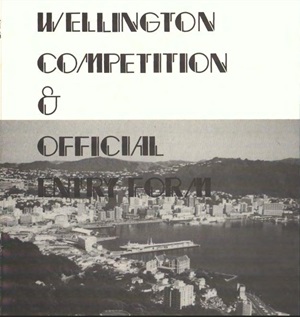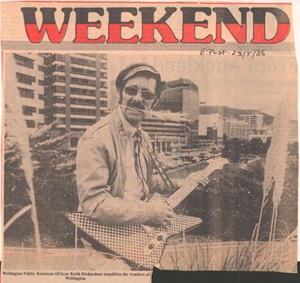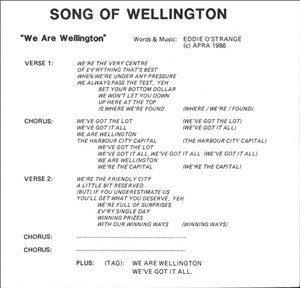The year was 1986. Shoulder pads were in, David Lange was Prime Minister, and $4000 was up for grabs for a catchy tune that could unify the capital.
The mission was to find a song that captured Wellington’s “fine civic spirit” and could be sung at all public occasions, from a rugby match to a formal reception.
On Monday 24 February in 1986, the Wellington mayor at the time, Ian Lawrence, launched the ‘Song of Wellington’ competition.
He told The Evening Post that Wellington had a sense of pride and identity second to none. The city had adopted the Harbour City logo, been promoted overseas, and “now it is time we literally sang our praises”.
The mayor said the song needed to have “popular appeal” and “a bit of a beat”.
“Otherwise it will not go down at sporting or competitive occasions. It will have to have words relatively easy to learn ... something easily sung by people ranging from school children to old people and relatively simple to be performed.”
Listen to We Are Wellington
According to another article, the successful song may have been a little too simple.
“We’ve got the lot. We’ve got it all. We are Wellington. The Harbour City Capital … more along those lines and you have a general picture of what the winning song of Wellington goes like.”
That was how The Evening Post of 26 May 1986 summed up Eddie O’Strange’s victorious tune, poking fun at its “imaginative title” of ‘We are Wellington’, but then acknowledging it was rather “a catchy wee ditty”.

At the time Eddie O’Strange (his stage name) had lived in Wellington for 17 years, according to the record booklet held at the Wellington City Archive. He had appeared on numerous television music programmes including Radio with Pictures, had written pantomimes for children, and composed a country and western hit, Living on Love, sung by Jodi Vaughan.
Before settling on Eddie’s “catchy wee ditty”, the competition judges sifted through 73 anonymous entries sent in from residents of the capital and from as far away as Dunedin and Napier.
To promote the contest, the Weekend Evening Post pictured then-Wellington City Council Public Relations Officer Keith Richardson standing like a rockstar in front of high rises holding a checked electric guitar and a toitoi stem between his teeth.
According to the article, he was “one Wellingtonian who has gone completely over-the-top with enthusiasm about the idea” of a tribute song to the city. “I’m so excited about it,” he told the paper, “I could burst because having heard the very, very high standard of entries I think it’s going to be a cracker.”
Keith, who was one of the judges, was quoted saying he hoped the winning song would “raise civic awareness” and continue to be sung in 100 years’ time.

The contest was run in conjunction with the United Multi Cultural Groups of Wellington, a committee made up of representatives from about 14 ethnic cultural groups active in the city, which put up the $4000 prize money for the winner.
We are Wellington was pressed as a 45 rpm single on vinyl, with a statement on the record sleeve explaining the origin of the competition.
“The idea of an official Song of Wellington was first born when the United Multi Cultural Groups staged their first show, an International Spectacular in 1983. It was suggested that a fitting finale to that show would be for all participants to sing a ‘Song of Wellington’. However, after extensive enquiries, it was discovered that no such song existed.”
Eddie’s song was announced as winner and first performed in the Michael Fowler Centre at the third International Spectacular on 24 May 1986. “The song was well received by an enthusiastic audience, being sung four times, instead of twice, as originally planned,” documents show.
But the song wasn’t embraced so kindly by everyone, with a television network broadcasting the song alongside shots of sewage at Moa Point – a move that saw the Council’s Public Relations Office lodge a formal complaint. “The item as broadcast has done a great dis-service to the City and indeed the composer of this fine song,” Keith said in his letter.

Singers on side one of the record were Jan Jackson and Bob Smith, while side two was a backing track so Wellingtonians could sing along reciting lyrics printed on the record sleeve.
Eddie is still around, hosting his long-standing weekly show, Town and Country Aotearoa, on Wellington Access Radio. He says he wrote the song with a “Pacific Island flavour”, but this was dropped from the track during the recording process, in which he was not involved, and it was instead “presented as a universal pop song”.
Eddie says We are Wellington was inspired by the city’s citizens. “Because every single person on this planet are part of the same iwi, it was obvious to me that Wellington is us, our whānau, the people.”
As well as the audio files, Wellington City Archives holds all the records of the Song of Wellington contest.
We are Wellington
Verse 1:
We’re the very centre
Of ev’rything that’s best
When we’re under any pressure
We always pass the test, yeh
Bet your bottom dollar
We won’t let you down
Up here at the top
Is where we’re found
(Where/We’re/found)
Chorus:
We’ve got the lot (We’ve got the lot)
We’ve got it all (We’ve got it all)
We are Wellington
The Harbour City Capital
We’ve got the lot (We’ve got the lot)
We’ve got it all (We’ve got it all)
We are Wellington
We’re the Capital
Verse 2:
We’re the friendly city
A little bit reserved
[But] if you underestimate us
You’ll get what you deserve, yeh
We’re full of surprises
Ev’ry single day
Winning prizes
With our winning ways
(Win/ning/ways)